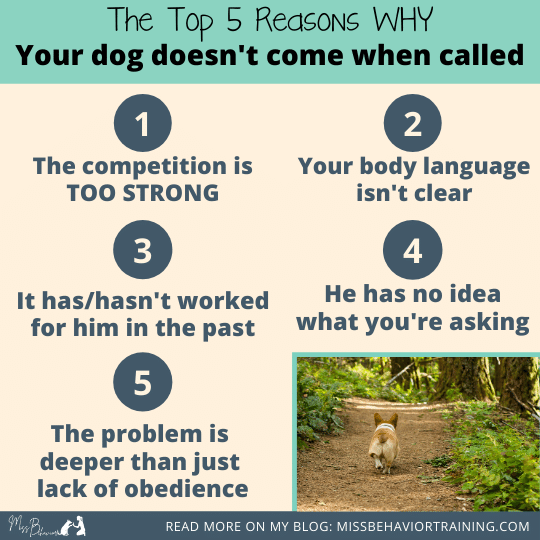Curious to know why your dog's recall isn't very good?When we call our dogs to come, we expect them to respond, for safety reasons and because at some point, it's time to end the free play... time to leave the dog park, time to go inside, time to go to work... but maybe your dog doesn't listen the way you want him to. In this blog post, I want to share the top 5 reasons why you might be struggling with it so that you can start to make positive changes going forward!  Something in the environment is likely either worrying your dog or making him too excited to be able to focus on your needs. If your dog is focused on hunting, sniffing, chasing, or playing - it's important that you recognize that and work within his learning zone. If he doesn't respond well at that distance when he's not distracted, it's very likely that he won't be able to process anything you say when he is distracted. On the other side of that, if something in the environment is worrying him (like loud noises or another dog who might tackle him if he runs), he is also going to struggle big time. It's important to address those concerns first. TRY THIS: In the meantime, have a long line on your dog when he goes out and just go take the leash, reward him for allowing you to get the leash (trust me, if he wanted to, he could also avoid that!), and head in. In the meantime, when he is less distracted or worried, practice your recall!  You might verbally be asking for one thing but non-verbally saying another. For example, leaning towards a dog while calling him to you sends two separate messages. In the world of body language, it's important to match our verbal language to our non-verbal language. In the case of the recall, this often gets mismatched. As human nature, we lean in towards the thing we're calling over to us, trying to invite them in. While that works for people, it doesn't work so well for dogs (unless we intentionally teach it to them that way). TRY THIS: When you want you dog to come closer to you, move away or turn away from him, getting him to chase you. Bonus points if you run away!  Past experience might tell him that if he comes, it'll lead to something he doesn't want (like removing freedom) OR if he ignores you long enough, you'll stop asking. When we are trying to teach our dogs anything, we need to make sure we understand what is rewarding or not so rewarding to our dogs. Coming inside from outside? That's most often a "punishment". Giving our dog a nice piece of steak for coming? That's usually a reward. Giving our dog a small dog treat and then locking them inside? Well... that's up for negotiation. Leashing our dogs up at the dog park because we're ready to go? Punishment. When you keep calling your dog and he doesn't listen, so you finally give up? Rewarding him for not coming. See my point? TRY THIS: When your dog is outside but not too distracted, call him and give him a jackpot of treats scattered on the ground. Repeat that 5x in a row before calling him inside and doing the same thing. Slowly practice this, under more and more distraction but don't OVERcall your dog. No dog wants to continually be interrupted from what he's focused on, unless the reward outweighs what he was doing  Your dog may not actually have the knowledge necessary to achieve the task. Be sure you have intentionally taught the skills needed for a good recall. Have you actually taught your dog what "come" means? Does it mean come within 6 feet? Come offer your collar? Come touch your hand? Move in your direction? What's the expectation? Keep your expectations clear and fair to your dog. He's not a machine. Sometimes we need to alter our expectations based on their needs TRY THIS: Teach your dog how to TARGET YOUR HAND. This is a great alternative to the basic recall or "come". Hand targeting has so many uses, this is just one of them. Grab my Hand Targeting Freebie to learn more and to see the lesson videos  Your dog may have some other problem getting in the way that hasn't been addressed. Sometimes our dogs have some deep-rooted associations with the recall and it's time to really dig in to where the problem is. Reach out for support addressing this problem and getting to the heart of the issue. Every dog is unique and sometimes it's their individual genetics, medical needs, or upbringing that needs addressing Which of these reasons do you feel like you or your dog struggles with the most? Let me know in the comments! If you are looking for more support understanding your dog from the inside out so you can better your relationship for the long haul, consider getting one-on-one help or joining my monthly academy membership where I have a COURSE for improving the Recall
1 Comment
Tracie
7/28/2021 08:59:36 am
I never thought that Echo might not want to run to me while barking at another dog because he might think this may cause the other dog to charge at him. Thanks for this insight.
Reply
Your comment will be posted after it is approved.
Leave a Reply. |
|
- Home
- About
- Blog
- Services
- Membership
-
Courses & Freebies
- All Courses
- FREE Boredom Buster Recipes
- COURSE: Building Resilience in your Family Dog
- COURSE: Managing the Leash Walk
- Potty Training COURSE
- Paws Off COURSE
- COURSE: Managing the Leash Walk
- FREE Attention Building Challenge
- FREE Scratchboard Training
- FREE Rest and Recovery Round-Up
- FREE Body Language 101
- Contact
- Home
- About
- Blog
- Services
- Membership
-
Courses & Freebies
- All Courses
- FREE Boredom Buster Recipes
- COURSE: Building Resilience in your Family Dog
- COURSE: Managing the Leash Walk
- Potty Training COURSE
- Paws Off COURSE
- COURSE: Managing the Leash Walk
- FREE Attention Building Challenge
- FREE Scratchboard Training
- FREE Rest and Recovery Round-Up
- FREE Body Language 101
- Contact
Search by typing & pressing enter





 RSS Feed
RSS Feed





